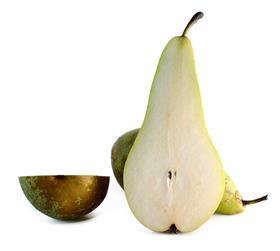
It’s that time of year again in the Netherlands, as the Dutch top-fruit crop is harvested.
Around 12,000 people are currently at work, picking the nation’s apple and pear crop, with Conference pears – which account for around 80 per cent of the nation’s pear production – the first to be picked.
Conditions haven’t been great over the last fortnight in the Netherlands ––there has been around 120mm of rainfall in that period, putting pressure on the harvesting period.
However, such weather pales in comparison to the stress caused by a strong assault of hailstones on 30 August. Herman Bus, of the Dutch fruit growers organisation, Nederlandse Fruittelers Organisatie, tells FPJ: “There was much hail, and this caused damage to between 70 and80 farms. It started in Zeeland, in the south, but it also hit growers in the middle area of the country.”
One Dutch top-fruit grower described the hail as being a “disaster” for the industry, but Bus says the farms affected by the damage have filed insurance claims and are in the process of being covered for the losses they sustained.
However, the price for juice apples has fallen, according to Bus, with greater availability of this product as a result of the weather damage. Yields of dessert apples good enough for eating are expected to be down by five per cent.
On the whole, though, it promises to be a strong year for those in the Dutch top-fruit industry. Bus says: “We expect fewer surprises; compared to the Russian ban last year, price levels are higher than they have been in the past, and there is more demand for fruit.”
A lot is expected of the Elstar apple crop this year, as it is up against a much smaller German harvest compared to 2014’s. However, Bus notes that Jonagold production is decreasing year on year: “The competition from the likes of Poland and eastern Europe is contributing to this,” he adds. “The prices are poor, and combined with the high costs of labour and land, Dutch growers just cannot compete with the offer being provided elsewhere.”
Dutch firm Fruitmasters played its part in the recent launch of a new club licensed pear called Migo. The product reportedly offers “sweetness, freshness and juiciness”, as well as “good storage potential and shelf life, a smooth peel, a beautiful shape and size, and good firmness.”
The future of Dutch top-fruit production, Bus believes, lies in club varieties like these. He tells FPJ: “It’s nice that there’s a new concept pear, as club varieties often have more influence on quality. The future lies in club varieties now, and it is playing a big part in production.”



